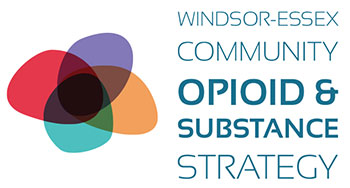
The Windsor-Essex Community Opioid and Substance Strategy (WECOSS) supports the development and implementation of comprehensive solutions and community-level initiatives to reduce the harms associated with substance use and enhance the quality and range of services and supports for substance use issues in this region.
The strategy was developed by the Windsor-Essex Community Opioid and Substance Strategy Leadership Committee in consultation with residents of the community, beginning with an environmental scan of existing community resources and review of best practices from other regions at the provincial, national, and international levels. This set of strategies was then further refined through a community consultation process involving two community forums and an online community feedback survey.
The development process resulted in the following set of recommendations that related specifically to opioids and the overdose:
- Support peer engagement and meaningful involvement of people with lived experience, as a critical feature for building local capacity.
- Support all healthcare providers to play a key role, through appropriate prescribing practices, patient education about opioids and overdose prevention and other pain management options.
- Provide early education and prevention about opioids and other substance use.
- Develop a local overdose monitoring and response system.
- Increase access to a variety of harm reduction options for people who use opioids and those affected by people who use opioids.
- Address stigma associated with problematic substance use through the development of supportive polices and education of healthcare professionals, community organizations and the public.
- Work with provincial partners to advocate for increased funding to expand the capacity of the local substance use treatment system.
- Redefine the role for enforcement agencies and other first responders to build “public safety-public health” partnerships for a safer and healthier community.
Effective community partnerships can help to develop and sustain comprehensive, community-level initiatives to reduce the harms associated with substance use [1] and enhance the quality and range of services and supports for substance use issues, in this region. The WECOSS utilizes a four pillar approach to addressing the harms of substance use at the community level; Prevention and Education, Harm Reduction, Treatment and Recovery, and Enforcement and Justice. Pillar-based working groups support implementation of activities outlined in the Action Plan. Working groups consist of community partners that are committed to a common purpose and set of activities. Each of the working groups also includes people with lived experience (PWLE) using substances, to provide their voice and input into programs and services that are developed.
WECOSS supports peer engagement and meaningful involvement of people with lived experience (PWLE) as a critical feature for building local capacity in Windsor and Essex County. Peers are people who have experience, either personally or through a friend or family member, with substance use disorders and with accessing or trying to access the treatment system. A key recommendation that emerged from the strategy development process, that was relevant across all four pillars, was the importance of meaningful involvement of people with lived experience. Peer engagement in planning and decision making which influence the services they access, is a central component of the WECOSS.

